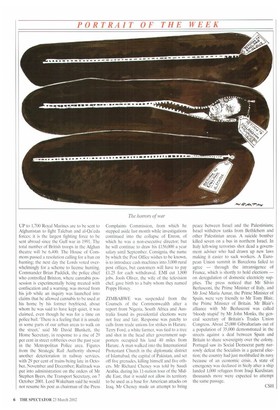PORTRAIT OF THE WEEK
UP to 1,700 Royal Marines are to be sent to Afghanistan to fight Taleban and al-Oa'eda forces; it is the largest fighting force to be sent abroad since the Gulf war in 1991. The total number of British troops in the Afghan theatre will be 6,400. The House of Commons passed a resolution calling for a ban on hunting; the next day the Lords voted overwhelmingly for a scheme to license hunting. Commander Brian Paddick, the police chief who controlled Brixton, where cannabis possession is experimentally being treated with confiscation and a warning, was moved from his job while an inquiry was launched into claims that he allowed cannabis to be used at his home by his former boyfriend, about whom he was said to have kept quiet, it was claimed, even though he was for a time on police bail. 'There is a feeling that it is unsafe in some parts of our urban areas to walk on the street,' said Mr David Blunkett, the Home Secretary, in response to a rise of 29 per cent in street robberies over the past year in the Metropolitan Police area. Figures from the Strategic Rail Authority showed another deterioration in railway services, with 29 per cent of trains being late in October, November and December; Railtrack was put into administration on the orders of Mr Stephen Byers, the Transport Secretary, on 7 October 2001. Lord Wakeharn said he would not resume his post as chairman of the Press Complaints Commission, from which he stepped aside last month while investigations continued into the collapse of Enron, of which he was a non-executive director; but he will continue to draw his £156,000 a year salary until September. Consignia, the name by which the Post Office wishes to be known, is to introduce cash machines into 3,000 rural post offices, but customers will have to pay 1.1.25 for each withdrawal. EMI cut 1,800 jobs. Jools Oliver, the wife of the television chef, gave birth to a baby whom they named Poppy Honey.
ZIMBABWE was suspended from the Counsels of the Commonwealth after a report from Nigeria, South Africa and Australia found its presidential elections were not free and fair. Response was patchy to calls from trade unions for strikes in Harare. Terry Ford, a white farmer, was tied to a tree and shot in the head after government supporters occupied his land 40 miles from Harare. A man walked into the International Protestant Church in the diplomatic district of Islamabad, the capital of Pakistan. and set off five grenades, killing himself and five others. Mr Richard Cheney was told by Saudi Arabia, during his 11-nation tour of the Middle East, that it would not allow its territory to be used as a base for American attacks on Iraq. Mr Cheney made an attempt to bring peace between Israel and the Palestinians; Israel withdrew tanks from Bethlehem and other Palestinian areas. A suicide bomber killed seven on a bus in northern Israel. In Italy left-wing terrorists shot dead a government adviser who had drawn up new laws making it easier to sack workers. A European Union summit in Barcelona failed to agree — through the intransigence of France, which is shortly to hold elections — on deregulation of domestic electricity supplies. The press noticed that Mr Silvio Berlusconi, the Prime Minister of Italy. and Mr Jose Maria Aznar, the Prime Minister of Spain, were very friendly to Mr Tony Blair, the Prime Minister of Britain. Mr Blair's alliance with Mr Berlusconi was called 'bloody stupid' by Mr John Monks, the general secretary of Britain's Trades Union Congress. About 25,000 Gibraltarians out of a population of 35,000 demonstrated in the streets against a deal between Spain and Britain to share sovereignty over the colony. Portugal saw its Social Democrat party narrowly defeat the Socialists in a general election: the country had just mothballed its navy because of an economic crisis. A state of emergency was declared in Sicily after a ship landed 1,000 refugees from Iraqi Kurdistan: thousands more were expected to attempt the same passage.


















































































 Previous page
Previous page